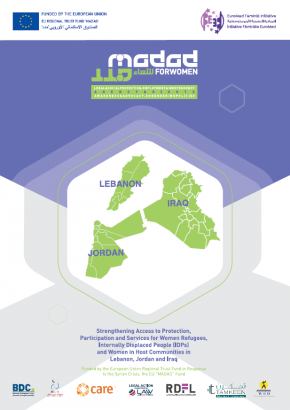Since the start of the war in Syria in 2011, millions of Syrians have become displaced creating the largest refugee crisis worldwide. The conflict has left many Syrian refugees across the Middle East and North Africa Region (MENA) living in extremely challenging situations, and lacking resources required to cover their basic needs. Moreover, the large influx of Syrian refugees as well as the overall political, economic and social developments in the MENA region are factors that have further challenged conditions for already vulnerable populations in host countries (3RP, 2018).
Countries most severely impacted by the influx of refugees are those directly bordering Syria, including Lebanon, Jordan, Turkey, Iraq and Egypt. According to figures from 2017, nearly 3.3 million of Lebanon’s population are in need, of which more than 1.5 million are Syrian refugees. In Lebanon, SGBV is still a significant problem for both Syrian and Lebanese women and girls. In fact, it is recognised by actors across the spectrum of legal, medical, humanitarian and development sectors that:
The demand for services to address SGBV far outweighs the supply.
The refugee and asylum seeker populations are both the most vulnerable to SGBV and the least likely to receive support.
The most obvious gap in service provision concerns legal assistance and access to justice.
The vast majority of survivors from the host community receive no legal services after experiencing SGBV, and access to the formal legal sector within the Syrian refugee and asylum seeker community is almost non-existent.
There are many constraints to providing avenues for legal redress to SGBV survivors, which include: Resistance within host communities to programmes focusing on increasing the access of refugees and asylum seekers to the formal legal sector. Inadequate legal framework.
Limited capacity within Lebanon to investigate, prosecute or hear SGBV cases to a standard that secures the rights of the survivors.
https://www.efi-ife.org/baseline-assessment-madad-women-main-findings-2019

